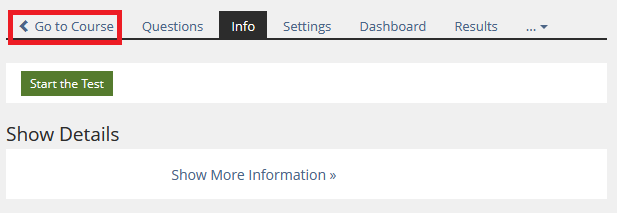Feature Wiki
Tabs
Optimize Navigation in Learning Sequences
Page Overview
[Hide]1 Initial Problem
There are some weaknesses regarding the navigation in a learning sequence:
Control option "User may proceed" in connection with tests, exercises, surveys, etc.:
'Objects of those types are opened from the learning sequence in a new window - so, when you return to the learning sequence, you have to reload the browser window (which will not be understood by a lot of users).
And if you do reload, not the same (updated) page will be displayed but the next page, without clicking "Next" (which will puzzle those who tackled the reload problem).In case users want to interrupt or close the learning sequence, it is not intuitively comprehensible for them why they have to use screen elements which are completely different from those in the button bar ("Next", "Previous").
The "X" symbol used to do so It is quite "silent", in the first place because it's off-focus, but also because it's a complete break of the graphical method - any other navigation element is textual.Control option "User may proceed" in connection with content pages that must be ...:
- marked as "Completed":
The behaviour of the "Next" button is quite error prone when settings of the learning sequence are changed while someone is processing it.Either you can always continue (regardless of whether you are marked as "Completed") or not at all (even if you are marked as "Completed" - and even if the setting is changed again so that you can "always" continue). - "Visited":
Opening the page should fulfil the requirement, however, the "Next" button is deactivated (while via the "Curriculum" the next step can be opened) - s. mantis.
- marked as "Completed":
2 Conceptual Summary
a) New Window Problem
There are some conceivable approaches:
Approach | Description | Similar Implementations | Advantages | Disadvantages |
Same window, kiosk mode for more object types | When opening an object from a learning seqence, this takes place in the same window. | Existing implementation for content pages and ILIAS learning modules |
|
|
Same window, return option | When opening an object from a learning seqence, this takes place in the same window. | Objective-oriented courses, screenshot below. |
|
|

3 User Interface Modifications
3.1 List of Affected Views
- started learning sequence (screen_id unknown)
3.2 User Interface Details
{ For each of these views please list all user interface elements that should be modified, added or removed. Please provide the textual appearance of the UI elements and their interactive behaviour. }
3.3 New User Interface Concepts
{ If the proposal introduces any completely new user interface elements, you might consult UI Kitchen Sink in order to find the necessary information to propose new UI-Concepts. Note that any maintainer might gladly assist you with this. }
3.4 Accessibility Implications
{ If the proposal contains potential accessibility issues that are neither covered by existing UI components nor clarified by guidelines, please list them here. For every potential issue please either propose a solution or write down a short risk assessment about potential fallout if there would be no solution for the issue. }
4 Technical Information
{ The maintainer has to provide necessary technical information, e.g. dependencies on other ILIAS components, necessary modifications in general services/architecture, potential security or performance issues. }
5 Privacy
{ Please list all personal data that will need to be stored or processed to implement this feature. For each date give a short explanation why it is necessary to use that date. }
6 Security
{ Does the feature include any special security relevant changes, e.g. the introducion of new endpoints or other new possible attack vectors. If yes, please explain these implications and include a commitment to deliver a written security concept as part of the feature development. This concept will need an additional approvement by the JourFixe. }
7 Contact
- Author of the Request: Suittenpointner, Florian [suittenpointner]
- Maintainer: Klees, Richard [rklees]
- Implementation of the feature is done by: {The maintainer must add the name of the implementing developer.}
8 Funding
- …
9 Discussion
10 Implementation
{ The maintainer has to give a description of the final implementation and add screenshots if possible. }
Test Cases
- {Test case number linked to Testrail} : {test case title}
Approval
Approved at {date} by {user}.
Last edited: 24. Aug 2022, 11:51, Suittenpointner, Florian [suittenpointner]